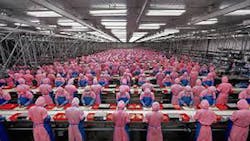BEIJING -- China's manufacturing activity expanded in September to a six-month high, HSBC said Monday, a further sign that a rebound in the world's second-largest economy is gaining momentum on improving demand.
The British banking giant's preliminary purchasing managers' index (PMI) for September hit 51.2, the highest since March when it stood at 51.6, HSBC said. The result was higher than last month's final reading of 50.1, which had improved from an 11-month low of 47.7 in July and ended three months of contraction, according to the bank.
The index tracks manufacturing activity in China's factories and workshops and is a closely watched gauge of the health of the world's second-largest economy. A reading above 50 indicates growth, while anything below signals contraction.
The September figure suggested China's ongoing growth rebound is consolidating on the back of "simultaneous improvements" in overseas and domestic demand, HSBC economist Qu Hongbin said in the release.
"We expect a more sustained recovery as the further filtering-through of fine-tuning measures should lift domestic demand," he said.
"This will create more favorable conditions to push forward reforms, which should in turn boost mid- and long-term growth outlooks."
Bank of America Merrill Lynch economists said that given the strengthening of the rebound, China is expected to achieve this year's growth target of 7.5%, which will likely lead Beijing to tone down its pro-growth rhetoric issued since late June.
"Good data since August means that markets should not expect a big stimulus package," said Lu Ting and Zhi Xiaojia in a research note, adding that fast-rising home prices are another constraint for continuing policy easing.
But the government is unlikely to take any aggressive tightening measures either, as growth and financial stability are still "highly valued" for the new leaders ahead of a key party meeting scheduled in November, they said.
Chinese authorities have so far been reluctant to introduce large-scale stimulus measures, but in late July did announce some steps to boost growth, such as reducing taxes on small companies and encouraging railway development.
The first half of this year saw fuelled concerns about China's economy after an expected rebound from growth of 7.7% last year -- the worst performance in 13 years -- failed to materialize.
Growth stood at 7.7% in the first three months of this year and slowed to 7.5% in the April-June period, but recent data, including strong exports and industrial output, have pointed to renewed strength in the economy.
Copyright Agence France-Presse, 2013
About the Author
Agence France-Presse
Copyright Agence France-Presse, 2002-2025. AFP text, photos, graphics and logos shall not be reproduced, published, broadcast, rewritten for broadcast or publication or redistributed directly or indirectly in any medium. AFP shall not be held liable for any delays, inaccuracies, errors or omissions in any AFP content, or for any actions taken in consequence.
